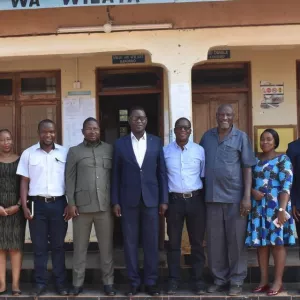Enhancing Climate Resilience for Beans in East Africa through a High-Level Governments’ Participation Approach
Through our ongoing workshops in East Africa, we have trained over 300 farmers and extension officers on the PICSA tool. These workshops were supported and endorsed by key agricultural and meteorological institutions, as well as high-level government officials, demonstrating significant buy-in and ownership. They focused on utilizing climate information to enhance resilience to climate variability. This initiative aims to promote

Enhancing Climate Resilience for Beans in East Africa through a High-Level Governments’ Participation Approach
Through our ongoing workshops in East Africa, we have trained over 300 farmers and extension officers on the PICSA tool. These workshops were supported and endorsed by key agricultural and meteorological institutions, as well as high-level government officials, demonstrating significant buy-in and ownership. They focused on utilizing climate information to enhance resilience to climate variability. This initiative aims to promote sustainable agricultural practices and strengthen the livelihoods of actors across the bean value chain.”
Tanzania’s picturesque Kagera and Kigoma regions and Kenya’s Nakuru, Machakos, Elgeyo Marakwet and Homabay counties are known for their bean production. Farmers are the backbone of these regions’ economies, working tirelessly to cultivate the land and provide for their families. However, like many agricultural regions in Sub- Saharan Africa, these areas face significant challenges due to climate variability. Addressing these challenges requires more than just technical solutions; it requires the involvement and support of high-level government officials to ensure successful implementation and sustainability of agricultural initiatives.
Recently, the Participatory Integrated Climate Services for Agriculture (PICSA) Lite Master Class was held in the Kagera region of Tanzania and in Nakuru, Kenya by the team from the Alliance project on ‘Enhanced Climate Resilience in East Africa (ECREA)’ project. The project is funded by the Foreign, Commonwealth & Development Office (FCDO) through the Met Office and the Weather and Climate Information Services (WISER) programme, in collaboration with other partners.
From April to June 2024, a series of workshops were held in Rwanda, Kenya and Tanzania, equipping bean farmers with climate information and other agro-advisory services to enhance their resilience to climate change and variability. So far, more than 300 farmers and extension officers have received face-to-face training using the PICSA approach, enabling them to pass on their knowledge to 400,000 farmers.
In Kenya, the workshop was led by Kenya Agricultural and Livestock Research Organization (KALRO). Speaking at the workshop, the Director of KALRO Katumani – Patrick Kesiem – highlighted that “it is essential to equip farmers with the knowledge and tools to thrive in a changing climate”. Kennedy Thiong’o – Deputy Director of Technical Services at the Kenya Meteorology Department (KMD) – stated: “We are committed to providing accurate seasonal forecasts to inform farmers’ decisions.” Their presence at the trainings highlighted the government’s commitment to strengthening agricultural practices and supporting the hardworking farmers who sustain their communities.

